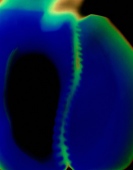Higher mortality rates for highest tertile of overall grade score for abdominal aortic calcification
TUESDAY, May 12, 2015 (HealthDay News) — Greater abdominal aortic calcification (AAC) severity, faster AAC progression, and higher mortality are seen for older men with severe disc degeneration, according to a study published in the May issue of Arthritis & Rheumatology.
Charline Estublier, M.D., from the Université de Lyon in France, and colleagues examined the correlation of disc degeneration with all-cause mortality and with the severity and rate of AAC progression in a cohort of 766 men aged older than 50 years. Participants underwent lateral spine radiography and blood collection.
The researchers found that the total overall grade score for AAC predicted all-cause mortality (hazard ratio [HR], 1.20 per standard deviation [SD] increase) after adjustment for confounders, including AAC. Higher mortality rates were seen for the highest tertile of the total overall grade score (39.3 per 1,000 person-years for a score of >8 versus 20.9 per 1,000 person-years for a score of 0 to 8; adjusted HR, 1.47). There was an increase in the odds of severe AAC with the total disc space narrowing score (adjusted HR, 1.44 per SD). Increasing total osteophyte score correlated with decreased probability of long-term AAC stability (adjusted HR, 0.66 per SD).
“Overall, our findings show that in older men, disc degeneration is associated with severe AAC and its faster progression as well as with higher rates of all-cause mortality (regardless of AAC severity),” the authors write. “Thus, similar to other skeletal sites, disc degeneration reflects poor health and may be deemed a marker of fragility.”
The study was partially funded by a grant from Merck Sharp & Dohme-Chibret.
Copyright © 2015 HealthDay. All rights reserved.








